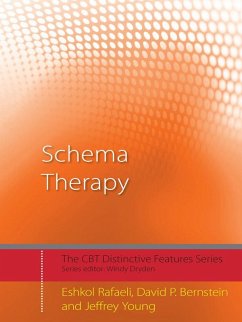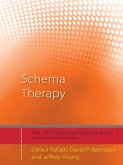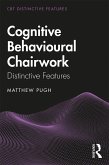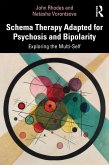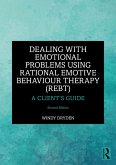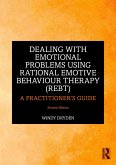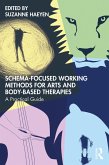20,95 €
20,95 €
inkl. MwSt.
Sofort per Download lieferbar

10 °P sammeln
20,95 €
Als Download kaufen

20,95 €
inkl. MwSt.
Sofort per Download lieferbar

10 °P sammeln
Jetzt verschenken
Alle Infos zum eBook verschenken
20,95 €
inkl. MwSt.
Sofort per Download lieferbar
Alle Infos zum eBook verschenken

10 °P sammeln
- Format: PDF
- Merkliste
- Auf die Merkliste
- Bewerten Bewerten
- Teilen
- Produkt teilen
- Produkterinnerung
- Produkterinnerung

Bitte loggen Sie sich zunächst in Ihr Kundenkonto ein oder registrieren Sie sich bei
bücher.de, um das eBook-Abo tolino select nutzen zu können.
Hier können Sie sich einloggen
Hier können Sie sich einloggen
Sie sind bereits eingeloggt. Klicken Sie auf 2. tolino select Abo, um fortzufahren.

Bitte loggen Sie sich zunächst in Ihr Kundenkonto ein oder registrieren Sie sich bei bücher.de, um das eBook-Abo tolino select nutzen zu können.
In this book, Eshkol Rafaeli, David P. Bernstein and Jeffrey Young - pioneers of the Schema Therapy approach - indicate the 30 distinctive features of Schema Therapy, and how the method fits into the broader CBT spectrum.
- Geräte: PC
- mit Kopierschutz
- eBook Hilfe
- Größe: 1.39MB
Andere Kunden interessierten sich auch für
![Schema Therapy (eBook, ePUB) Schema Therapy (eBook, ePUB)]() Eshkol RafaeliSchema Therapy (eBook, ePUB)20,95 €
Eshkol RafaeliSchema Therapy (eBook, ePUB)20,95 €![Cognitive Behavioural Chairwork (eBook, PDF) Cognitive Behavioural Chairwork (eBook, PDF)]() Matthew PughCognitive Behavioural Chairwork (eBook, PDF)20,95 €
Matthew PughCognitive Behavioural Chairwork (eBook, PDF)20,95 €![Schema Therapy Adapted for Psychosis and Bipolarity (eBook, PDF) Schema Therapy Adapted for Psychosis and Bipolarity (eBook, PDF)]() John RhodesSchema Therapy Adapted for Psychosis and Bipolarity (eBook, PDF)28,95 €
John RhodesSchema Therapy Adapted for Psychosis and Bipolarity (eBook, PDF)28,95 €![Dealing with Emotional Problems Using Rational Emotive Behaviour Therapy (REBT) (eBook, PDF) Dealing with Emotional Problems Using Rational Emotive Behaviour Therapy (REBT) (eBook, PDF)]() Windy DrydenDealing with Emotional Problems Using Rational Emotive Behaviour Therapy (REBT) (eBook, PDF)23,95 €
Windy DrydenDealing with Emotional Problems Using Rational Emotive Behaviour Therapy (REBT) (eBook, PDF)23,95 €![Dealing with Emotional Problems Using Rational Emotive Behaviour Therapy (REBT) (eBook, PDF) Dealing with Emotional Problems Using Rational Emotive Behaviour Therapy (REBT) (eBook, PDF)]() Windy DrydenDealing with Emotional Problems Using Rational Emotive Behaviour Therapy (REBT) (eBook, PDF)28,95 €
Windy DrydenDealing with Emotional Problems Using Rational Emotive Behaviour Therapy (REBT) (eBook, PDF)28,95 €![Core Clinical Competencies in Counseling and Psychotherapy (eBook, PDF) Core Clinical Competencies in Counseling and Psychotherapy (eBook, PDF)]() Len SperryCore Clinical Competencies in Counseling and Psychotherapy (eBook, PDF)45,95 €
Len SperryCore Clinical Competencies in Counseling and Psychotherapy (eBook, PDF)45,95 €![Schema-Focused Working Methods for Arts and Body-Based Therapies (eBook, PDF) Schema-Focused Working Methods for Arts and Body-Based Therapies (eBook, PDF)]() Schema-Focused Working Methods for Arts and Body-Based Therapies (eBook, PDF)33,95 €
Schema-Focused Working Methods for Arts and Body-Based Therapies (eBook, PDF)33,95 €-
-
-
In this book, Eshkol Rafaeli, David P. Bernstein and Jeffrey Young - pioneers of the Schema Therapy approach - indicate the 30 distinctive features of Schema Therapy, and how the method fits into the broader CBT spectrum.
Dieser Download kann aus rechtlichen Gründen nur mit Rechnungsadresse in A, B, BG, CY, CZ, D, DK, EW, E, FIN, F, GR, HR, H, IRL, I, LT, L, LR, M, NL, PL, P, R, S, SLO, SK ausgeliefert werden.
Produktdetails
- Produktdetails
- Verlag: Taylor & Francis eBooks
- Seitenzahl: 184
- Erscheinungstermin: 13. September 2010
- Englisch
- ISBN-13: 9781136900594
- Artikelnr.: 47896280
- Verlag: Taylor & Francis eBooks
- Seitenzahl: 184
- Erscheinungstermin: 13. September 2010
- Englisch
- ISBN-13: 9781136900594
- Artikelnr.: 47896280
- Herstellerkennzeichnung Die Herstellerinformationen sind derzeit nicht verfügbar.
Eshkol Rafaeli is a Clinical Psychologist specializing in both cognitive behavioral therapy and Schema Therapy and is Associate Professor at Bar-Ilan University.
David P. Bernstein is a Clinical Psychologist and a Cognitive and Schema Therapist, an is Associate Professor in the Faculty of Psychology at Maastricht University, The Netherlands.
Jeffrey Young is the Founder and Director of the Cognitive Therapy Centers of New York and Connecticut, and the Schema Therapy Institute in New York City.
David P. Bernstein is a Clinical Psychologist and a Cognitive and Schema Therapist, an is Associate Professor in the Faculty of Psychology at Maastricht University, The Netherlands.
Jeffrey Young is the Founder and Director of the Cognitive Therapy Centers of New York and Connecticut, and the Schema Therapy Institute in New York City.
Part I: Theoretical Points. Universal Core Emotional Needs. Early
Maladaptive Schema Development as a Consequence of Unmet Needs. A Taxonomy
of Early Maladaptive Schemas. Coping Styles and Responses. Coping Styles:
Surrender Responses. Coping Styles: Avoidance Responses. Coping Styles:
Overcompensation Responses. Schema Modes as States (The State vs. Trait
Distinction). The Wounded Core: Vulnerable Child Mode. Angry and Impulsive
Child Modes. Maladaptive Coping Modes. Internalized Parental Modes. Healthy
Modes: Healthy Adult, Contented Child. Limited Reparenting. Empathic
Confrontation. Part II: Practical Points. The Assessment Process: Focused
Life History Interview, Schema Inventories, and Self-monitoring. The
Assessment Process: Guided Imagery. The Assessment Process: In-session
Behaviours and the Therapy Relationship. Educating the Patient About the
Schema and Mode Models, and Using the Schema Case Conceptualization Form.
Toolbox 1: Relational Techniques. Toolbox 2: Cognitive Techniques. Toolbox
3: Emotion-focused Techniques. Toolbox 4: Behavioral Pattern Breaking. Mode
Dialogues and Imagery. Specific Points for Working with Borderline
Personality Disorder. Specific Points for Working with Narcissistic
Personality Disorder and Antisocial Personality Disorder. Specific Points
for Working with Couples. Interplay Between Schema Therapy for Axis II and
CBT for Axis I. The Therapeutic Relationship: Limited Reparenting.
Therapists' Own Schemas.
Maladaptive Schema Development as a Consequence of Unmet Needs. A Taxonomy
of Early Maladaptive Schemas. Coping Styles and Responses. Coping Styles:
Surrender Responses. Coping Styles: Avoidance Responses. Coping Styles:
Overcompensation Responses. Schema Modes as States (The State vs. Trait
Distinction). The Wounded Core: Vulnerable Child Mode. Angry and Impulsive
Child Modes. Maladaptive Coping Modes. Internalized Parental Modes. Healthy
Modes: Healthy Adult, Contented Child. Limited Reparenting. Empathic
Confrontation. Part II: Practical Points. The Assessment Process: Focused
Life History Interview, Schema Inventories, and Self-monitoring. The
Assessment Process: Guided Imagery. The Assessment Process: In-session
Behaviours and the Therapy Relationship. Educating the Patient About the
Schema and Mode Models, and Using the Schema Case Conceptualization Form.
Toolbox 1: Relational Techniques. Toolbox 2: Cognitive Techniques. Toolbox
3: Emotion-focused Techniques. Toolbox 4: Behavioral Pattern Breaking. Mode
Dialogues and Imagery. Specific Points for Working with Borderline
Personality Disorder. Specific Points for Working with Narcissistic
Personality Disorder and Antisocial Personality Disorder. Specific Points
for Working with Couples. Interplay Between Schema Therapy for Axis II and
CBT for Axis I. The Therapeutic Relationship: Limited Reparenting.
Therapists' Own Schemas.
Part I: Theoretical Points. Universal Core Emotional Needs. Early
Maladaptive Schema Development as a Consequence of Unmet Needs. A Taxonomy
of Early Maladaptive Schemas. Coping Styles and Responses. Coping Styles:
Surrender Responses. Coping Styles: Avoidance Responses. Coping Styles:
Overcompensation Responses. Schema Modes as States (The State vs. Trait
Distinction). The Wounded Core: Vulnerable Child Mode. Angry and Impulsive
Child Modes. Maladaptive Coping Modes. Internalized Parental Modes. Healthy
Modes: Healthy Adult, Contented Child. Limited Reparenting. Empathic
Confrontation. Part II: Practical Points. The Assessment Process: Focused
Life History Interview, Schema Inventories, and Self-monitoring. The
Assessment Process: Guided Imagery. The Assessment Process: In-session
Behaviours and the Therapy Relationship. Educating the Patient About the
Schema and Mode Models, and Using the Schema Case Conceptualization Form.
Toolbox 1: Relational Techniques. Toolbox 2: Cognitive Techniques. Toolbox
3: Emotion-focused Techniques. Toolbox 4: Behavioral Pattern Breaking. Mode
Dialogues and Imagery. Specific Points for Working with Borderline
Personality Disorder. Specific Points for Working with Narcissistic
Personality Disorder and Antisocial Personality Disorder. Specific Points
for Working with Couples. Interplay Between Schema Therapy for Axis II and
CBT for Axis I. The Therapeutic Relationship: Limited Reparenting.
Therapists' Own Schemas.
Maladaptive Schema Development as a Consequence of Unmet Needs. A Taxonomy
of Early Maladaptive Schemas. Coping Styles and Responses. Coping Styles:
Surrender Responses. Coping Styles: Avoidance Responses. Coping Styles:
Overcompensation Responses. Schema Modes as States (The State vs. Trait
Distinction). The Wounded Core: Vulnerable Child Mode. Angry and Impulsive
Child Modes. Maladaptive Coping Modes. Internalized Parental Modes. Healthy
Modes: Healthy Adult, Contented Child. Limited Reparenting. Empathic
Confrontation. Part II: Practical Points. The Assessment Process: Focused
Life History Interview, Schema Inventories, and Self-monitoring. The
Assessment Process: Guided Imagery. The Assessment Process: In-session
Behaviours and the Therapy Relationship. Educating the Patient About the
Schema and Mode Models, and Using the Schema Case Conceptualization Form.
Toolbox 1: Relational Techniques. Toolbox 2: Cognitive Techniques. Toolbox
3: Emotion-focused Techniques. Toolbox 4: Behavioral Pattern Breaking. Mode
Dialogues and Imagery. Specific Points for Working with Borderline
Personality Disorder. Specific Points for Working with Narcissistic
Personality Disorder and Antisocial Personality Disorder. Specific Points
for Working with Couples. Interplay Between Schema Therapy for Axis II and
CBT for Axis I. The Therapeutic Relationship: Limited Reparenting.
Therapists' Own Schemas.
